TR Interview: Don Coscarelli Tries Till the End on John Dies at the End
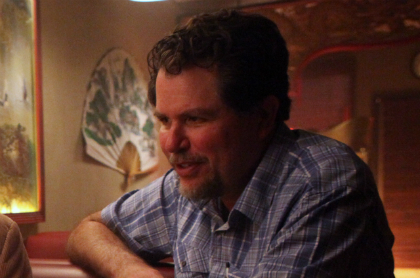 |
Yesterday, I ran an interview with acclaimed actor Paul Giamatti about his performance and executive producer in the odd horror/comedy/sci-fi/drug-trip flick John Dies at the End. Following our conversation, I got to talk to his director, Don Coscarelli, who has a track record of making cult films that get remembered, from The Beastmaster to Phantasm to Bubba Ho-Tep. The oddball auteur’s latest feels like one that will similarly endure, so long as people get to see it.
Yes, some of the questions are very similar, but Coscarelli’s take on things, as always, is his own. And some answers will become clearer after you’ve seen the film. Or maybe not – it’s a weird one. But unlike some other filmmakers out there, this is one director who trusts the audience to figure things out for themselves, and while that doesn’t always make for massive profits, it has bought him an intensely loyal following over the years.
Luke Y. Thompson: I loved the movie. I’ve gotta say, even though it’s only January, it’s clearly going to be one of the most original movies of 2013.
Don Coscarelli: Hey, that’s nice to hear! I appreciate hearing that – thank you for saying that.
LYT: It’s a hallmark of your work, that you come up with these insanely original twists on supernatural and sci-fi things. Paul [Giamatti] was saying that it was a little tough to get made because of how different it is. What was the struggle like for you, to get this from conception to screen?
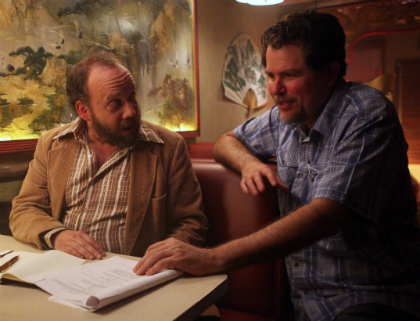 |
DC: Well, it was a long, long journey. We didn’t have the hugest budget in the world. I read the book, and I saw that this could be something that was really amazing, a great jumping-off point for a very interesting movie. Finding the funding wasn’t easy. I had actually teamed up with Paul and his partner Dan Carey; they have a production company, and they were assisting me with trying to get the movie placed and we had some ups and downs with that, and it became clear very quickly that we were not going to get any mainstream funding from studio-type companies. While they “got” the book, and they also believed that mainstream audiences wouldn’t accept it.
And I’m not sure that I believe that, because I think it’s so different that folks hopefully would really enjoy it, if presented to them properly. In any case, we had cobbled together a much smaller budget, to try to find a way to resolve some of the questions in terms of the effects and all of that. It was an ongoing and seemingly never-ending challenge once the project started, but thank God, folks like yourself seem to accept it, so I’m very happy about that.
LYT: Do you find it amazing what you can do on a low budget today, as opposed to what you could do on a low budget in the ’80s?
DC: Absolutely. There’s certainly no question that you currently have all the tools at your desktop; the power and speed of the machines and software has increased by orders of magnitude. But a lot of those tools you need to use correctly, and even though this is the first entirely digital film that I’ve shot, I’m not sure that I don’t still like film better, but it’s a hell of a lot easier to go this route. Just even the cost of visual effects! I think it was in the mid-’90s I used my first digital effects in Phantasm 3, and I think we got two of them for something like $10,000 – it was a fortune. And nowadays those effects could probably be done for free by a friend who is pretty decent with After Effects. The tools are there, and for aspiring film makers, absolutely.
But you know, things haven’t changed that much on the distribution side of things just yet. They are shifting over to digital distribution, but there’s still a tremendous amount of promotion, and costs and advertising that are required to launch a movie, and that’s still a very old-school process. They haven’t changed that much.
LYT: One of the things that I really like about this movie is that even though I don’t feel like I understand everything in it, I could still follow it, and there was more there if I wanted to delve into it. How much of the mythology do you feel you completely understand? Is it all completely worked out in your head, or were there some loose ends that you still don’t completely know?
DC: I don’t know that I understand it, but I have theories about it, and I think that’s OK, and I guess I’ve got a comfort level. Because, you know, when I made the first Phantasm, many years ago, I was a younger person and I took some risks when I made the movie and edited that movie, in terms of what we were actually explaining, and I was able to learn at an early age, by experiences with audiences, that audiences will accept and embrace mystery. Some won’t – a small minority will just reject it out of hand, but many people really enjoy having a film that they can ruminate on, think about and talk with their friends about. It certainly worked with Phantasm, and I think with John Dies at the End, leaving some of the stuff open-ended isn’t necessarily a bad thing. I could be wrong, but so far the result is that folks are accepting it. The point is that I’m not sure there are any hard and fast answer to any of this stuff, as far as what is the nature of the ultimate evil in the universe at the end of John Dies at the End, or what is the soy sauce [drug], but I have my own speculations, and I think that the folks that watch it will have their interpretations too, and that’s probably a good thing.
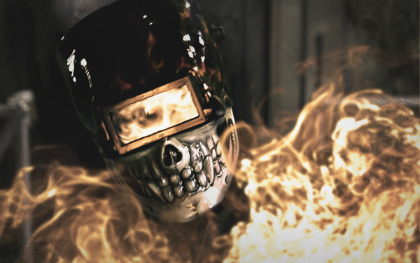 |
LYT: I was wondering if you thought that Doug Jones’ character was part of the Tall Man’s race, because he seemed to have a lot in common with him, on a superficial level at least.
DC: (laughs) That’s a fascinating idea. See, this is the kind of interpretation I enjoy. Just by you saying that, it makes me think that would have been interesting to have designed his costume a little differently. We could have had some fun with that!
LYT: Can you tell me a little bit about the inspiration for the masks in the parallel world, what those were and how you came to using that particular design?
DC: Well, the masks were a creation of David Wong, in that they were in the book from the start, and the idea that it was just a weird contradiction that the greeting party would come and hide their faces but bare their bodies – that I thought was interesting and funny to me. In terms of finding the masks, it was just a function of trying to find some way economically – always economically – of getting a massive number of masks that people could wear with interesting designs. So they found online a mask designer named Willie Richardson who created these half-masks, he calls them, for acting schools; they buy them in bulk for schools. For the actors, when they put on the mask it’s very freeing and liberating. It’s an interesting idea; it makes me think about trying that some day in rehearsal. Anyway, we just bought a bunch from him, and I just loved that design
LYT: The character in the alternate universe who sort of created the tangent, Cyrus Rooney – does he have any basis in reality, or was that just invented?
DC: No, that was completely invented. He’s a fictional character as far as I know. The concept that there might be two parallel universes where the death of one guy can cause so much strangeness was an element of the book that I thought was great. I know it gets way the hell out there in that part of the movie, but I like to think that audiences will stick with it and enjoy it.
LYT: Have you ever been tempted to do a movie that’s a lot simpler just for the paycheck, or is it just more important to hold onto the creative reins?
DC: That’s an interesting question. I’ve had my opportunities through the years with various sequels and studio-type projects that just didn’t work out for one reason or another. But absolutely, I would like to one day find myself in a situation where some producer will bring me a wonderfully written project on a silver platter, and another silver platter with $40 million to make the movie, but it hasn’t really worked out that way. The kind of offers that I’ve gotten were retread-type sequel stuff, just nothing that I could really do that well with. That being said, I’m not averse at all to working in the studio world as some kind of position that I have, it’s just that I’m still looking for the right opportunity at this point.
LYT: When you mention retreads, I was thinking someone must have made you an offer to do a big-budget Phantasm remake, right?
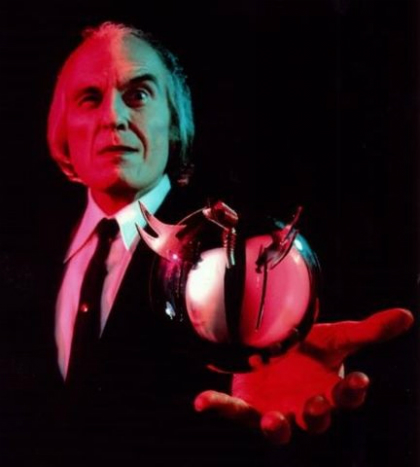 |
DC: There was a lot of talk a couple of years ago when they were really impassioned, although here we are in this year, and I see there are two big ones coming up [Texas Chainsaw and Evil Dead], and I see that one was really successful over the weekend, so it’ll probably start up again. I don’t know what to tell you about that because the way that the studios approach it, they have their ways of making movies, and they’re going to come up with some kind of a script, and I don’t know whether they would treat the movie as respectfully as I’d like to see it, and that’s always the challenge. They’d want to recast with all new folks, probably from the CW network actor-model types, and who’s going to replace Angus Scrimm? I don’t know if that guy has been born yet. So there are a lot of big questions with that kind of proposition, and I never really had an answer that sat well, but I guess if they offer me enough money one day, I’m like everybody else – who knows?
LYT: Is Bubba Nosferatu your next movie?
DC: I don’t think so. It doesn’t appear to have – we had had the funding put together at one point, but that appears to have evaporated now. I was never able to really get Bruce Campbell involved in it, either, so there’s some question about who would play Elvis, so it’s been a bit on the back burner. I think one day it might happen; Elvis is eternal, after all! I’m happy to hear that folks are interested in that.
LYT: I was talking to Paul, and he seemed enthused to play Col. Parker.
DC: And he would be awesome in it! There’s just a couple of moving parts that we have to figure out to make it a reality. I don’t know. I don’t have quick answers right now for if it’s going to happen.
LYT: How did you like the Bubba Ho-Tep action figures that came out?
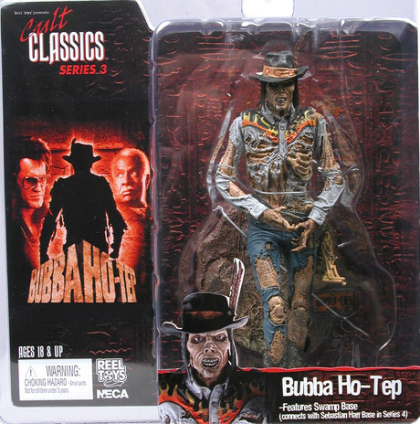 |
DC: I liked them a lot! I thought the design on them was terrific. I thought they really got the Elvis/Bruce Campbell likeness down great, and I thought the mummy was superb. We had done, about 8 years ago, there was a Tall Man model that didn’t turn out that great, but this one was great – the Bubba one.
LYT: Do you have a next movie lined up? Do you know what your next project is?
DC: No, I really don’t. I’m just doing my best to get this thing successfully off the launching pad. If that happens, it should help to get me some direction or scope. It’s been almost a 3-year process working on this, and it’s really been quite taxing, I’ve been involved in promotional, and I also did a lot of noodling with it, even after I premiered it. The curse of the digital stuff is that I continue to edit the movie and refine special effects even after it had premiered at several film festivals, because it’s easy with the digital, but it’s like quicksand – you get sucked into it and you never finish the movie!
LYT: What’s it been like doing the festival circuit of non-genre festivals, like AFI Fest? Do you find that it’s like a whole new level of acceptance that there wasn’t before?
DC: Oh, absolutely, because the funny thing about it is that the ongoing genre festivals have established that the midnight audience is really viable, and now a lot of more mainstream and “intellectual” type of film festivals want to get on that bandwagon and sell a lot of tickets at midnight shows, because they’ve already got their festival in place, and it’s a good profit center for them, I think. The good part of it for us was that we got to play in some cool places to different audiences. We played in San Francisco, in Seattle, at AFI – those were all good venues for us.
LYT: And if you do seriously get this off the launch pad, as you say, are there plans to expand this world further for you?
DC: I certainly think that we have a lot of inherent material built in, we’ve got the novel sections that we didn’t put into the movie, we’ve got an entire sequel written by David Wong which is pretty great, and the two guys who play John and Dave, I really like them a lot – they’re good actors and a lot of fun – so yeah, there’s a possibility, but we wouldn’t know any answers on that for a few months.
LYT: Having said that, I have to ask you the question in reverse – do you ever get tired of people just asking about sequels to your pre-existing works, as opposed to wanting you to do something new?
DC: (laughs) Look, I could take it the wrong way, but I love it, because it used to be “Phantasm! Phantasm! Phantasm! Where’s the Bubba? Phantasm!” And now they’re talking about all three of them – I find that funny and wonderful. So absolutely, thanks for asking about it.
John Dies at the End is now available to view on-demand, and opens in select theaters January 25th.
